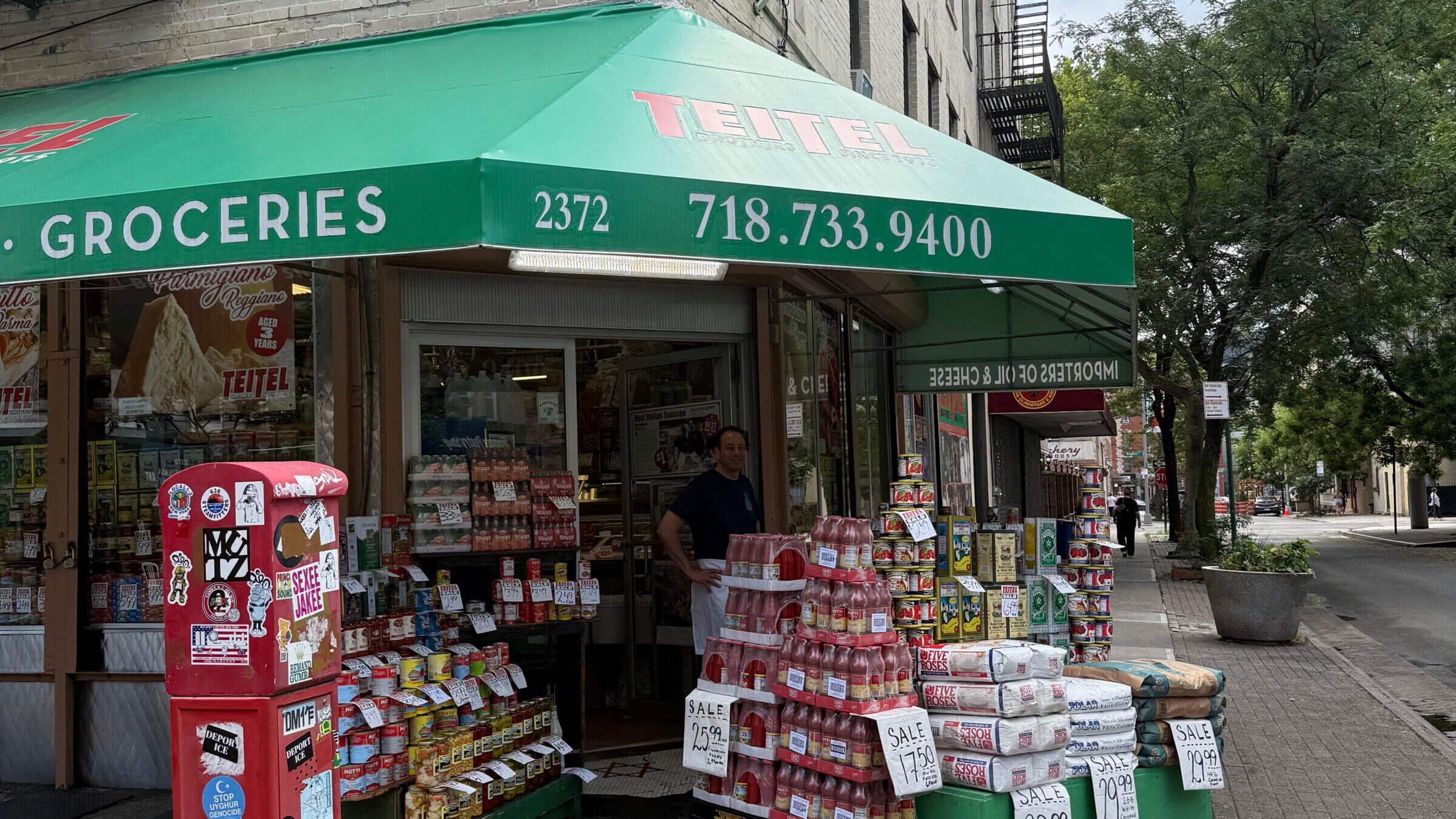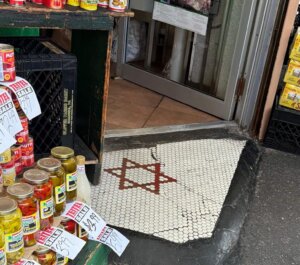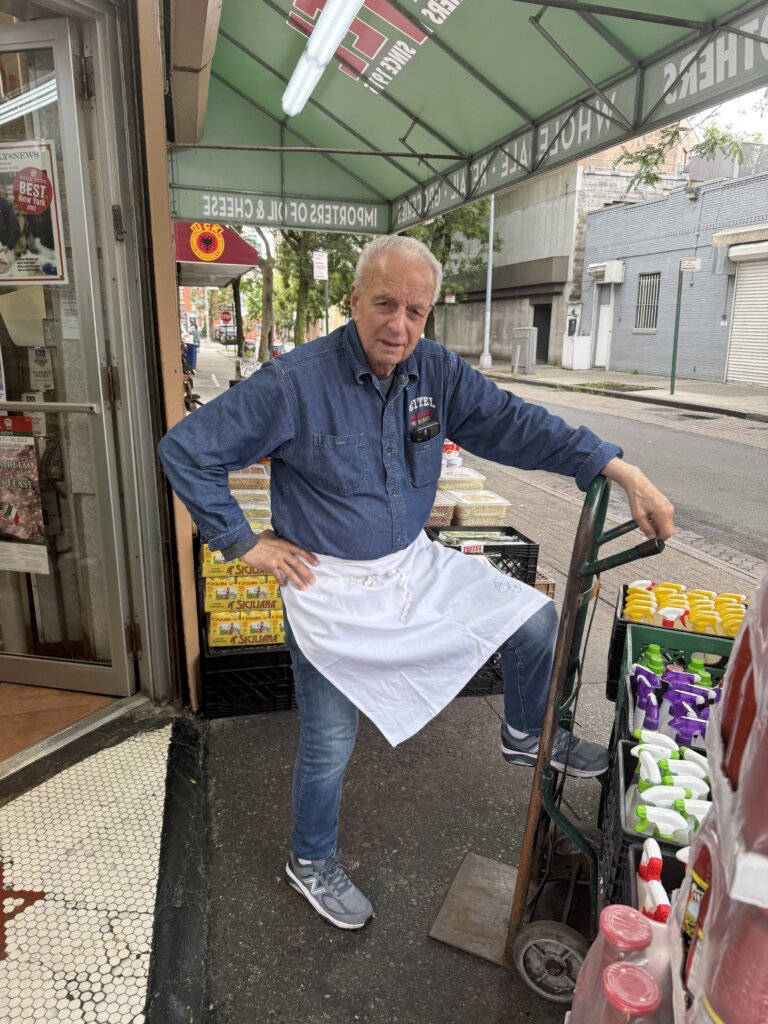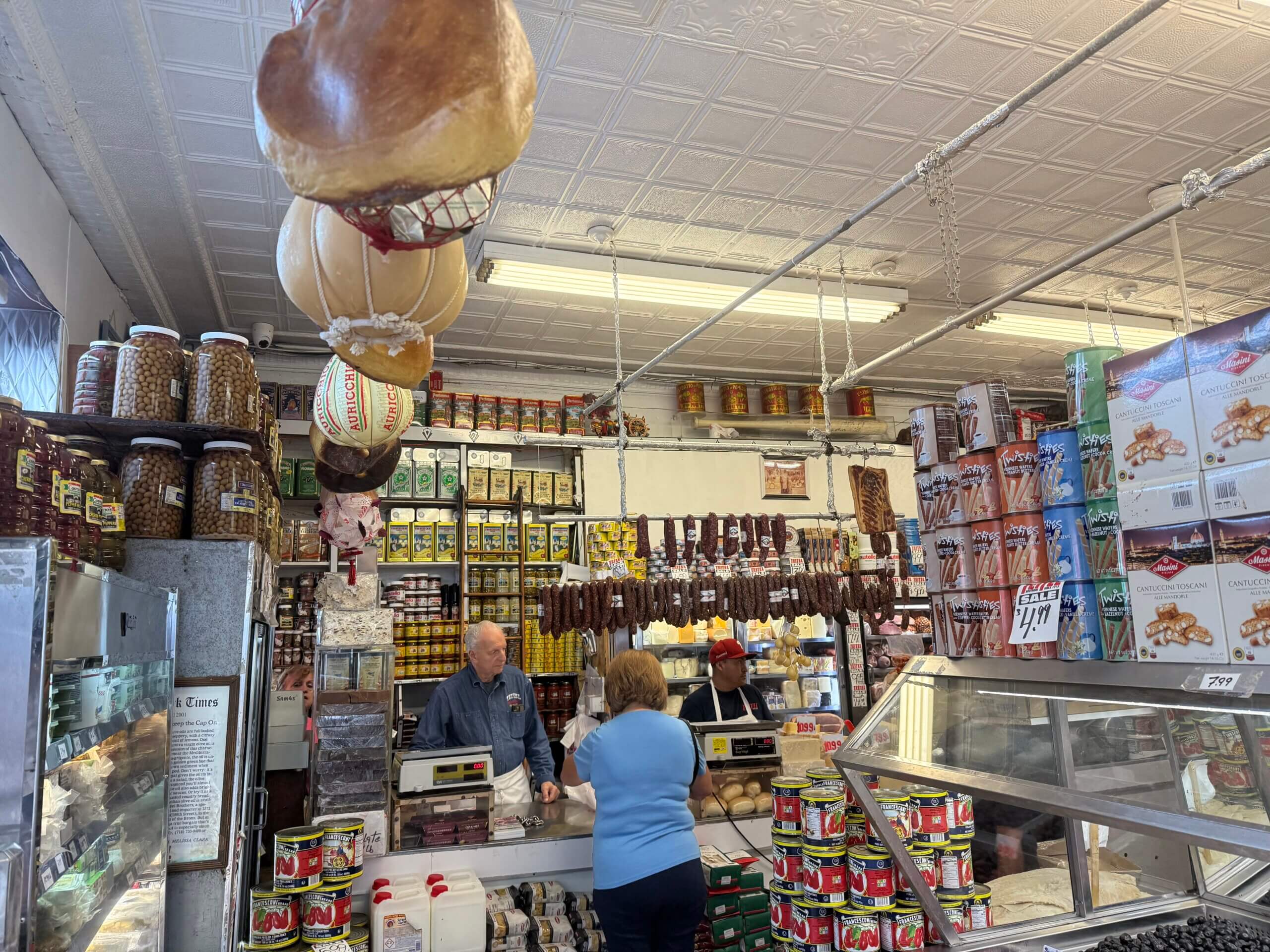For 110 years, a proudly Jewish family has been a treasured purveyor of pork
How Teitel Brothers on Arthur Avenue keeps Jewish values and Italian food in the family

Teitel Brothers Wholesale Grocery on Arthur Avenue and 186th Street. Eddie Teitel stands by the entrance. Photo by PJ Grisar
Every Friday night, Gilbert Teitel’s mother would wash the floors in their Bronx apartment, set down newspapers (likely the Forverts), light the candles and serve a kosher meal. Then, at the start of the day of rest, the real work began: Downstairs, the family’s Italian grocery would fill orders for all manner of pork products from their neighbors who came in after dinner.
The store would stay open till 1 a.m. sending out deliveries to its customers’ houses. It would continue on like this through Saturday. Sunday’s hours worked around the last mass at church, and then the cycle would start over again on Monday.
“They worked hard,” said Teitel, 87, who, with his three sons, runs Teitel Brothers Wholesale Grocery, a 110-year-old institution on the Bronx’s Arthur Avenue started by Teitel’s father and uncle. “It was tough making a living.”

Asked if selling soppressata or capicola was ever a problem for the family, Orthodox immigrants from Tarnobrzeg in what is now Poland, Teitel pointed to a pattern of contrasting tiles by the store entrance: a crimson Star of David mosaic added in the 1930s, in response to events in Europe.
“I know my parents had relatives who didn’t make it to the United States,” Teitel said, leaning against a handcart outside the store, a pen tucked behind his ear. “It was a statement.”
Teitel’s father and uncle, Jacob and Morris, arrived in the U.S. in the 1890s as young men. They were tailors by trade, but after they saw the success of their cousins in Williamsburg, they went into the grocery business.
The brothers, Yiddish speakers who kept kosher at home, learned Italian before they learned English. Competition on Arthur Avenue, then a bustling community of Italian immigrants, was fierce.
At the time bakeries and fish stores sold grocery staples like olives and cheeses, Teitel told me. To stay competitive his father and uncle would price goods to the half cent. The Teitel Brothers weren’t the only Jewish merchants in their day, but are now one of the oldest storefronts on Arthur Avenue, with a dedicated sign for Teitel Brothers Lane.
The block has changed since Gilbert started working full time on Feb. 1, 1959. Italians left for the suburbs. Albanian immigrants revitalized the Belmont neighborhood in the 1970s, starting as building supers and then becoming landlords. The area is now over 61 percent Latino, and the Teitel Brothers’ employees chat in Spanish while wrapping cold cuts at lightning speed under a hanging canopy of their award-winning sausage. But the store’s counters, and the family that man them, are original.
While the 900-square-foot store hasn’t changed much, the business model has. The grocery now runs a mail order business and distributes to restaurants in the five boroughs and Pennsylvania.

The San Marzano tomatoes are really from San Marzano. The Mozzarella cheese, which a woman’s small dog snacked on in a car parked out front, is authentic. The three brands of olive oil they stock, all certified DOP (Denominazione di Origine Protetta) by the Italian food authorities, are named for members of the Teitel family, including Gilbert’s son Eddie (EDDA), who was there the morning I visited.
Eddie estimates the store’s inventory includes more than 100 shapes of pasta, some varieties with gluten-free options. They import soap from Italy and, Gilbert made sure to mention, dates from Israel. (Teitel, incidentally, comes from the Yiddish word for date.)
Two women, customers for 40 years, drove in from New Rochelle to pick up panettone and figs. Could they find them elsewhere?
“Not this good,” one said. The local fire department seems to agree, parking their engine outside to pick up supplies for lunch at the station.
Many of the Teitels’ patrons drive in from the suburbs to show their grandchildren where they shopped as kids. Gilbert Teitel now lives in the Country Club neighborhood in the East Bronx; two of his sons reside in Rockland County and one in Whitestone.

But Eddie Teitel says that the internet and food tourism have been great for business, drawing in foodies whose forebears may have never set foot in the Bronx. He travels annually to Italy to see what’s new there. The pistachio craze is real, but he also loves a vaguely Yiddish-sounding toasted wheat called fregola that he says is “incredible with seafood.”
Teitel Brothers may stand as a testament how, in a neighborhood in flux, quality can guarantee endurance. And it’s part of a larger immigrant story that is ongoing.
“This has always been an area for immigrants,” Eddie Teitel said. They may move on, but they return for their roots. “They come here and they want a good loaf of bread, there are three bakeries here, you got two butcher shops, you have two fish stores, so they come and they get the best from each and every one of them and they bring it home.”
Dealing in treyf while proudly Jewish — the store shutters for the Jewish holidays — is a mark of pride.
“It feels good to be doing something that no one else has done,” Eddie said.
Today that means saving shelf space for the needs of newer communities while staying true to what made the business thrive: drums of olive oil and tomato cans stamped with the Teitel name. In a twist only the U.S. could deliver, that Ashkenazi surname has become synonymous with Italian authenticity.
But do they ever get tired of Italian food?
“A friend of mine threw a party for a Jewish friend of ours, and he had sturgeon, he had lox, he had bagels,” recalled Gilbert Teitel, who grew up eating this kind of spread at Kutsher’s and the Majestic Hote.
“They also had fresh mozzarell with roasted peppers,” he added, dropping the “a” like a proper paisan. “Well, I went for the fresh mozzarell and the roasted peppers.”

















